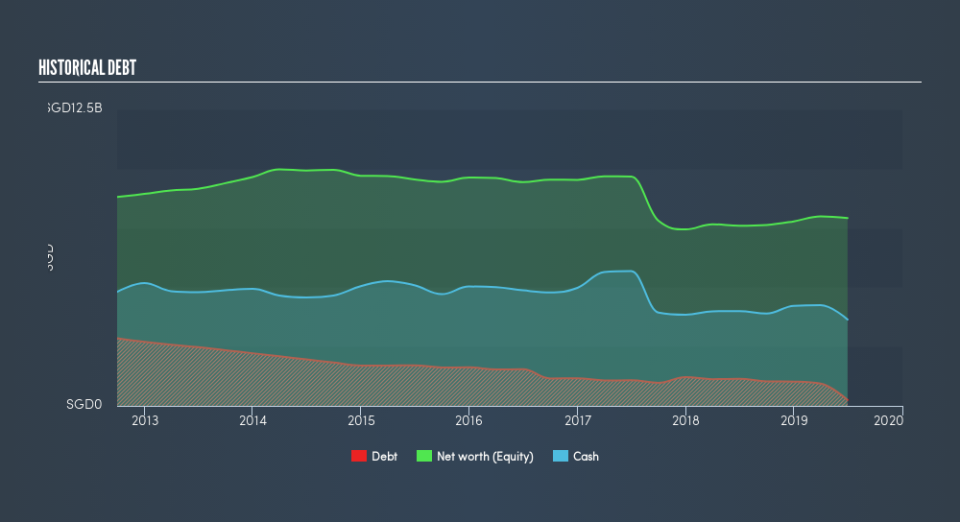Is Genting Singapore (SGX:G13) A Risky Investment?

Warren Buffett famously said, 'Volatility is far from synonymous with risk.' So it seems the smart money knows that debt - which is usually involved in bankruptcies - is a very important factor, when you assess how risky a company is. We can see that Genting Singapore Limited (SGX:G13) does use debt in its business. But the real question is whether this debt is making the company risky.
When Is Debt A Problem?
Generally speaking, debt only becomes a real problem when a company can't easily pay it off, either by raising capital or with its own cash flow. Part and parcel of capitalism is the process of 'creative destruction' where failed businesses are mercilessly liquidated by their bankers. However, a more frequent (but still costly) occurrence is where a company must issue shares at bargain-basement prices, permanently diluting shareholders, just to shore up its balance sheet. Of course, the upside of debt is that it often represents cheap capital, especially when it replaces dilution in a company with the ability to reinvest at high rates of return. The first thing to do when considering how much debt a business uses is to look at its cash and debt together.
See our latest analysis for Genting Singapore
What Is Genting Singapore's Debt?
As you can see below, Genting Singapore had S$251.5m of debt at June 2019, down from S$1.15b a year prior. But it also has S$3.64b in cash to offset that, meaning it has S$3.39b net cash.
How Healthy Is Genting Singapore's Balance Sheet?
We can see from the most recent balance sheet that Genting Singapore had liabilities of S$626.3m falling due within a year, and liabilities of S$538.4m due beyond that. On the other hand, it had cash of S$3.64b and S$148.4m worth of receivables due within a year. So it can boast S$2.63b more liquid assets than total liabilities.
It's good to see that Genting Singapore has plenty of liquidity on its balance sheet, suggesting conservative management of liabilities. Because it has plenty of assets, it is unlikely to have trouble with its lenders. Simply put, the fact that Genting Singapore has more cash than debt is arguably a good indication that it can manage its debt safely.
While Genting Singapore doesn't seem to have gained much on the EBIT line, at least earnings remain stable for now. The balance sheet is clearly the area to focus on when you are analysing debt. But ultimately the future profitability of the business will decide if Genting Singapore can strengthen its balance sheet over time. So if you want to see what the professionals think, you might find this free report on analyst profit forecasts to be interesting.
But our final consideration is also important, because a company cannot pay debt with paper profits; it needs cold hard cash. Genting Singapore may have net cash on the balance sheet, but it is still interesting to look at how well the business converts its earnings before interest and tax (EBIT) to free cash flow, because that will influence both its need for, and its capacity to manage debt. Happily for any shareholders, Genting Singapore actually produced more free cash flow than EBIT over the last three years. That sort of strong cash conversion gets us as excited as the crowd when the beat drops at a Daft Punk concert.
Summing up
While we empathize with investors who find debt concerning, you should keep in mind that Genting Singapore has net cash of S$3.4b, as well as more liquid assets than liabilities. And it impressed us with free cash flow of S$868m, being 119% of its EBIT. So we don't think Genting Singapore's use of debt is risky. We'd be very excited to see if Genting Singapore insiders have been snapping up shares. If you are too, then click on this link right now to take a (free) peek at our list of reported insider transactions.
Of course, if you're the type of investor who prefers buying stocks without the burden of debt, then don't hesitate to discover our exclusive list of net cash growth stocks, today.
We aim to bring you long-term focused research analysis driven by fundamental data. Note that our analysis may not factor in the latest price-sensitive company announcements or qualitative material.
If you spot an error that warrants correction, please contact the editor at editorial-team@simplywallst.com. This article by Simply Wall St is general in nature. It does not constitute a recommendation to buy or sell any stock, and does not take account of your objectives, or your financial situation. Simply Wall St has no position in the stocks mentioned. Thank you for reading.


